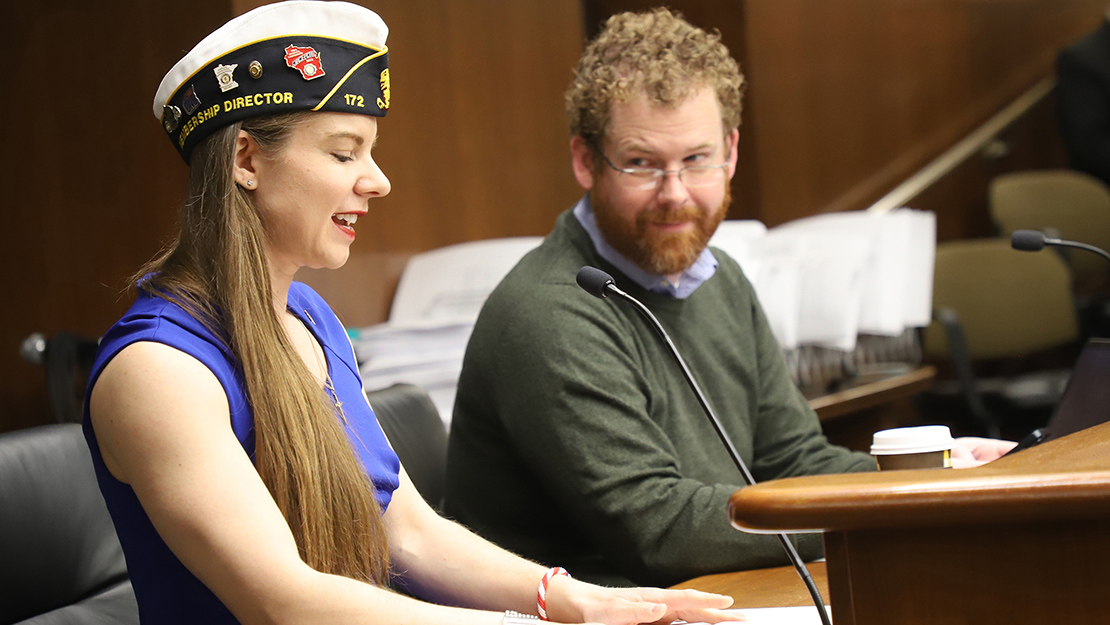Sports betting bill close to finish

As of press time, it was waiting a turn on the House floor
ST. PAUL — The sports-betting bill containing tax relief for charitable gambling was close to the finish line at the state Legislature as of press time.
It was slated to be heard on the House floor on May 15. However, after long debates on many other subjects, House File 5274 (previously HF2000) did not get a turn. As of press time, it was described as “on the table.” The Legionnaire was sent to the printing presses in Madelia the afternoon of May 16.
Advocates now hope to be heard May 17, which gives the measure less time to cross the path of the Senate before the Legislature adjourns May 20.
“Right now, Minnesota charities and our American Legion posts involved in charitable gambling operations are disappointed that once again we’ve been put in the middle of partisan fights,” said Minnesota American Legion Legislative Chairwoman Kristy Janigo.
“We asked lawmakers to give us our tax cuts and finally bring relief for all charities and aid for all Minnesotans in the nonprofit sector. For years, we’ve been promised some sort of relief, and it just hasn’t come.”
She expressed gratitude for the American Legion posts and their gambling managers who have supported the bill and understand the need for tax relief.
The posts and units of The American Legion are the largest segment of charitable gambling organizations in the state, at 193 license holders.
She is grateful for the support from Allied Charities of Minnesota, chief author Rep. Zack Stephenson of Coon Rapids and co-author Rep. Ginny Klevorn of Plymouth.
She even offered thanks to the Minnesota Indian Gaming Association. While she opposed MIGA’s involvement with e-pulltab changes in 2023, MIGA firmly supported tax cuts for charitable gambling this session.
Janigo held out hope the bill might pass this year, but, if not, it has made an impression, which would impact the 2025 session.
“I sure hope this can still happen,” she said.
She encouraged members to watch legionnaire.org or the Department of Minnesota Facebook page to find out what happens after the May 20 adjournment.
The sports-betting bill survived the House Ways & Means Committee on Friday, May 10. The committee approved the measure on a voice vote.
State Rep. Zack Stephenson testified how, in the first year, tax cuts for charitable gambling add up to $7 million, in the second year $24 million and in the third $40 million. However, the tax cuts only kick in if sports betting revenue is high enough.
He faced questions about that contingency. Projections show state revenue from taxing sports betting will be double or even more than double the amount to be reduced from charitable gambling, he replied. This, he said, is based on estimates of the growth of sports gambling in other states.
He said the notion of the state failing to reach the expected revenue to trigger charitable gambling tax cuts is doubtful.
“I think it is very unlikely. In fact, it’s extremely unlikely,” Stephenson said.
An opponent said giving the green light to sports betting will create a black market.
Just the opposite is true, Stephenson said. “There already exists a black market for sports betting in Minnesota. This will turn it from a black market to a legitimate one,” he said.
There was debate over whether a fiscal note reflected the true cost of criminal enforcement; however, others noted that regulating a previously criminal activity naturally would reduce crime, not increase it. Stephenson also noted that registration fees would more than pay for start-up costs for regulating the industry.
The biggest difference on the measure remains its treatment of horse racing tracks. The bill, as it stood May 10, provided $650,000 to the Minnesota Racing Commission for an economic development fund, from which its proceeds can increase purses. However, Rep. Brian Pfarr said it isn’t enough.
By May 15, the bill had been changed into percentages, likely to yield higher results. The Racing Commission would oversee the account.
There remains debate about the tribal casino’s long-held exclusivity to slot machines. Tribes say horse-racing machines at tracks seem too similar. Yet others are concerned, citing last year’s fight over e-pulltabs, about tribes wanting to use their clout to reduce competition for the overall entertainment dollar.
The veterans community — Legion, VFW, Amvets — along with other charities have no stance on the debate regarding the tribes and tracks. They are focused on long-promised tax cuts.
State Rep. Pat Garofalo, near the end of the hearing, talked about how compromise on the bill seems close at hand to make the language bipartisan and bicameral.
The bill passed the House Tax Committee on a 12-9 vote April 30. It includes provisions allowing congressionally chartered veterans organizations to use more of their gambling proceeds to repair their buildings after June 30, 2024 and before Aug. 1, 2029.



